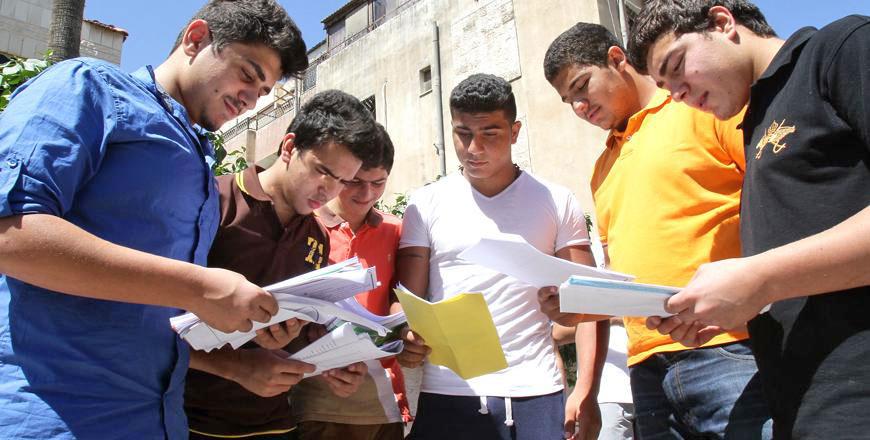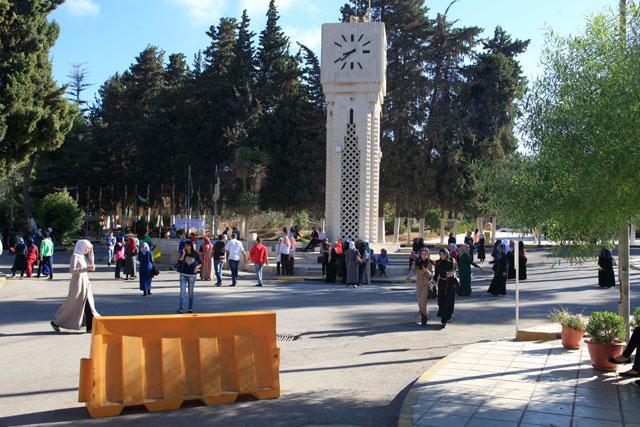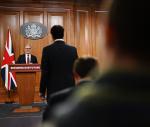You are here
Students’ rights organisation urges review of Tawjihi, tuition fees
By Ana V. Ibáñez Prieto - Oct 02,2018 - Last updated at Oct 02,2018

Members of the campaign said the large number of high school graduates and their high rates in the Tawjihi examination came from a political decision not educational developments (File photo)
AMMAN — The National Campaign for Defending Students’ Rights (Thabahtoona) on Monday called for the revision of educational policies concerning the General Secondary Education Certificate Examination (Tawjihi) through the formation of joint committees among the concerned ministries, in addition to studying tuition fees for official universities to make them proportional to the means of middle class citizens.
In a report on university admission rates for the academic year of 2018-2019 issued by the campaign, students claimed that “the results of the unified admission list for local public universities prove a lack of coordination between the Ministry of Education and the Higher Education Ministry”, lamenting that “the students and their parents are bearing the cost of these errors”.
The members of the campaign said the “large” number of high school graduates and their high rates in the Tawjihi examination came from “a political decision rather than a result of the developments in education”, stating that “the results of this situation have been borne by official universities”.
The report charged that “the high rates of the students passing Tawjihi this year have forced the Higher Education Ministry to increase the number of admissions in public universities”, pointing out that the number of students admitted at official universities increased from 29,713 in the academic year of 2017-2018 to 32,174 in this academic year.
“The statement that there is a lack of coordination between the concerned ministries is completely untrue,” Higher education ministry Adel Tweisi told The Jordan Times on Tuesday, stressing that “coordination does exists in a weekly, and even a daily basis”.
Concerning the accusations of the results of the Tawjihi examination and their effect in university admissions, Tweisi said that the Higher Education Ministry remained in constant contact with Prime Minister Omar Razzaz when the premier held the position of minister of education, during which Razzaz set the standards of the new Tawjihi system.
The Ministry of Education was not available for comment despite several attempts by The Jordan Times.
The campaigners also identified “significant, worrisome figures” in the parallel admissions list, citing differences between the lowest acceptance rate and the unified admissions list, which went beyond 20 per cent, according to the report.
“Such figures reflect the catastrophic scale of the expansion of the parallel admissions programme and the extent of its negative impact on the outputs of higher education,” the campaigners said.
Tweisi responded that the Higher Education Council stipulates that the percentage of students admitted in the parallel programme shall not surpass 30 per cent of the capacity in any specialty, stressing that the Ministry of Higher Education has been monitoring compliance with this rule over the past two years.
“While it is true that two universities exceeded the percentage two years ago, I did meet with their presidents and gave them instructions to abide the percentage stipulated,” the minister continued.
Seeking to prevent further negative effects on higher education outputs, the Thabahtoona campaign called on the ministry to take direct responsibility for admissions through the parallel programme as a first step to “completely eliminate it”.
In this regard, Tweisi clarified that the parallel admissions programme is not a mandatory programme, but an option available for those students with lower marks.
Concerning the “high” tuition fees denounced by Thabahtoona in the parallel programme, the official stressed that “the Higher Education Ministry has no control over them, as according to the Universities Law, the boards of trustees of each university are responsible for this matter”.
The campaigners also criticised the difference between the regular minimum admission rate and the minimum acceptance mark for students accepted through exceptions, claiming that the difference reached more than the 10 per cent in the most demanded specialties.
“In this case, what the campaigners are referring to is the Royal Decree that sets the quotas for underprivileged youth and students coming from the Badia,” Tweisi told The Jordan Times in this regard, stressing that “it is not possible to compare the marks of those accepted through the unified admissions list and the unprivileged students, as they do not enjoy the same opportunities”.
Concerning specific universities, Thabahtoona called for the revision of tuition fees imposed by the German Jordanian University, asking for higher supervision by the ministry in this regard.
In addition, the campaigners asked the concerned authorities to prevent the University of Islamic Sciences from continuing to raise tuition fees, demanding its elimination from the unified acceptance list if the fees increase again.
Regarding specialties, the report recommended the revision of the number of admissions in medical colleges in order to gradually reduce them, stressing that the acceptance rate in medical specialities has increased by 200 per cent since 2005.
Responding to the remarks, Tweisi commented that “while it is true that number of admitted students has doubled since 2005, it is necessary to consider that back then, only 2 universities with medical faculties existed in the Kindgom as compared to the 6 universities we currently have”.
Related Articles
AMMAN — Some 29,000 out of 32,000 eligible students have so far applied to public universities through the Unified Admissions List, while th
AMMAN — A decision to halt parallel programmes at public universities has been postponed till 2020 due to the lack of alternative means of s
AMMAN — A total of 10,966 students have been accepted at public universities for the 2016-2017 spring semester, the Unified Admission Commit
















